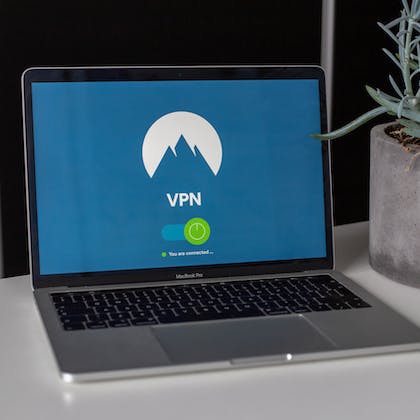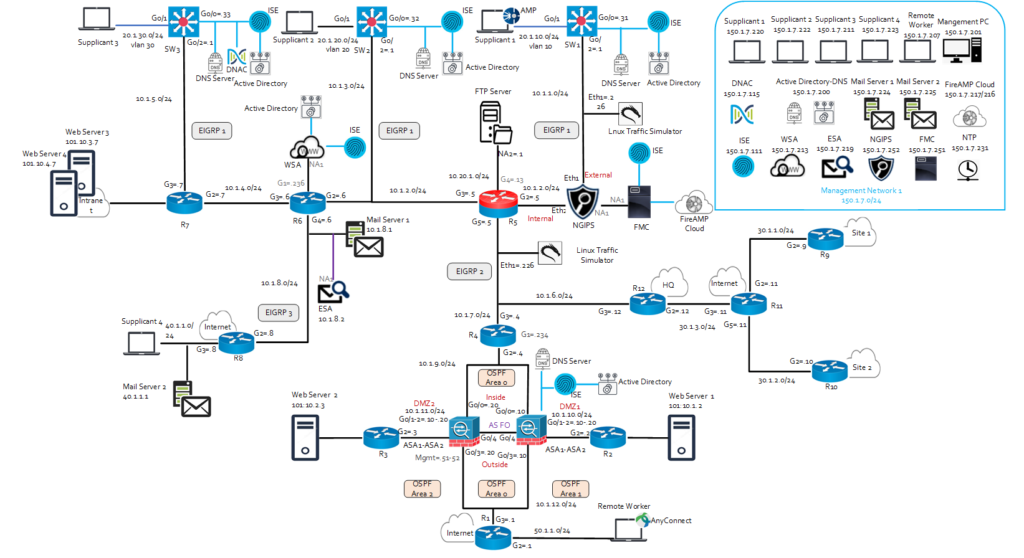

EXPLORE.PERSIST.MASTER.
CCIE Data Center Certification and Training.
Share :
+971 43346660
CCIE Data Center Certification v3.0 is the highest and most prestigious certification from Cisco. It ranks No. 1 in the 10 Most Difficult IT Certifications list, and is highly-valued worldwide. A CCIE certified individual is an elite title in the field of network engineering, proving their mastery in their domain of Cisco networking. The CCIE Data Center Certified experts have the knowledge and skills required to architect, engineer, implement, troubleshoot, and support data center technologies using the latest methods.
The CCIE Data Center program is designed to include focus on Layer 2 and Layer 3 connectivity, fabric infrastructure, storage networking and computing, network services, and automation and orchestration. The quality of the program, the testing methods, and the relevance of this certification enhances its value. At IP Rulers, the classes are facilitated by CCIE Data Center certified and experienced instructors, and students will be exposed to the latest equipments. With grouped as well as one-to-one classes and online tutorials that could be scheduled for weekdays or weekends in accordance to the students’ choice, IP Rulers is fast becoming a leading name in Dubai, UAE in achieving high-value Cisco Certification with a significant pass rate on the first attempt.
Target Audience:
- Network engineers attempting the core exam – (DCCOR 350- 601)
- Network engineers who have five to seven years of professional experience in designing, deploying, operating and optimizing data center technologies.
- Network designers who design and support complex data center technologies and topologies.
- Network engineers who use an expert-level problem-solving process (including options analysis) to support complex network technologies and topologies.
- IT students and professionals seeking strong expertise in the subject and an internationally recognized qualification in the same for prospective jobs.
- Candidates with CCNP Data Center Certification, moving on to expert levels.
- Aspirants in the following job profiles:
- Network Designer
- Network Administrator
- Consulting Systems Engineer
- Technical Solutions Architect
- Network Manager
- Cisco Integrators and partners
Prerequisites:
- The CCIE Data Center does not require any particular qualification for attendance of the course. However, comprehensive knowledge of the subjects is necessary for attending the examinations.
- Five to seven years’ experience in networking field, especially in designing, deploying, operating and optimizing data center technologies will be an advantage to attempt the CCIE examination.
- Job roles of elite executives in the fast-paced world of Enterprise network .
- Industry-level knowledge and direct experience in implementation of core Cisco enterprise infrastructure solutions.
- Ability to recognize customer requirements and support proposed solutions.
- Enhanced job opportunities with sky-high career growth, coupled with respectable compensations.
- Expertise in all stages of implementing complex networking solutions – from creation and analysis, to operation and optimization.
- Essential skills in networking automation and network programmability in the fast-changing world of technology.
- Specialist Certification for clearing the qualifying exam.
- Authority to link the CCIE Certification Badge to all social media profiles.
Duration
120
Skill Level
Expert
Certificate
Yes
Modules
7
Language
English
Mode
Online/Offline
Key Highlights
- Live Instructor-Led Training (Online & Classroom)
- 120 Hours of Technology Lectures
- 40 Hours of Lab Preparation
- Weekdays (Tue - Fri)
- Weekend (Fri-Sat or Sat-Sun)
- Boot Camp Training for a Fast Track Learning
- Written Question Bank to Clear CLCOR
- Eve-ng Set up on the laptop with images
- A workbook intended for the technology lectures
- Demand-driven recorded video lectures for references
Key Highlights
- Hands-on Lab Practice
- Most Updated and Passable Workbook
- Unlimited Real Rack Access Until you pass or a Version Change
- Support Until you pass or a Version Change
- Detailed Explanation of the Real Lab Solution by the Expert
- Individual Attention given once the real lab preparation started
- 24/7 Access to the Learning Resources
- Flexible Installment Plans
- Instructor support is readily accessible via Email & Whatsapp
Course Curriculam
1.1 Layer 2 technologies
- Link Aggregation
- vPC
- PortChannel
- Tagging/Trunking
- Static Path binding
- Spanning Tree Protocol
- PVST
- MST
1.2 Routing Protocols and features
- OSPF (v2 and v3)
- Authentication
- Adjacencies
- Network types and Area Types
- LSA Types
- Route Aggregation/Summarization
- Route Redistribution
- ISIS
- Adjacencies
- Single area, single topology
- Network types, Levels and Router types
- NSAP addressing
- Point-to-point, broadcast
- BGP
- Path Selection
- External and Internal Peering
- Route reflectors and Route Server
- Peer Templates
- Multi-Hop EBGP
- Route Aggregation/Summarization
- Route Redistribution
- BFD
- FHRP
1.3 Multicast protocols
- PIM
- Sparse Mode
- BiDir
- Static RP, BSR, AutoRP, PhantomRP
- IPv4 PIM Anycast
- IPv4 Anycast RP using MSDP
- IGMP
- IGMPv2, IGMPv3
- IGMP Snooping
- IGMP Querier
2.1 Physical fabric components
- Fabric Discovery
- Controllers/Network Managers
- Switches
2.2 Fabric policies
- Access Policies
- Multi Tenancy
- Monitoring Policies
2.3 Tenant Policies
- Application profiles and EPGs
- Networking
- Security
2.4 Fabric Monitoring
- Faults
- Events
- Health indicators
- Audit Logs
2.5 Virtual Networking
- vSphere VDS
3.1 VRF lite
3.2 L3Out
- OSPF
- Authentication
- Adjacencies
- Network types and Area Types
- Route Redistribution
- BGP
- AS manipulation
- External and Internal Peering
- Route reflectors
- Route Redistribution
- Transit Routing
3.3 Inter Fabric connectivity
- Multi-Pod
- Multi-Site
- Virtual POD
- remote Leaf
3.4 Overlays
- VXLAN EVPN
4.1 Compute Resources
- UCSM Policies, Profiles and Templates
- Hyperflex
4.2 Compute Connectivity
- SAN/LAN uplinks
- Rack server integration
- Port Modes
5.1 FC and FCoE
- Zoning
- NPV/NPIV
- Trunking
- Portchannel
- Load Balancing
5.2 iSCSI
- Authentication
- Multipathing
5.3 RoCE v2 over IP Networks
6.1 Security features
- ACL’s
- First Hop Security
- Port security
- Private VLANs
- Contracts
6.2 RBAC
- Radius
- TACACS+
- LDAP
- AAA
6.3 Network Services Insertion and Redirection
- Policy Based Routing
- Policy Based Redirection
- Inter VRF communication
- Route Targets
- Prefix Lists
6.4 Services
- Flow/Telemetry Export
- SPAN
- SNMP
- Syslog
- DHCP
- NTP/PTP
6.5 Traffic management
- Queueing
- Policing
- Classification/Marking
- Scheduling
- CoPP
7.1 Data center tasks using scripts (Python and Ansible)
- Create, Read, Update, Delete using RESTful APIs
- Deploy and modify configurations
- Statistics, Data Collection
7.2 Data Center Automation and Orchestration using tools
- DCNM
- UCSD
- Tasks
- Workflows
- Catalog
- Intersight
- CloudCenter Suite
- Applications
- Deployments
- Action Orchest
lab infrastructure.

CCIE enterprise infrastructure v1.1 equipment and software list:


The practical exam tests candidates on solutions that can be configured using the below
Equipment and software versions. Candidates may see more recent software versions
during their attempt but will only be tested on features that are supported in the list below.
Passing the exam requires a depth of understanding difficult to obtain without hands-on
experience. Early in your preparation you should arrange access to equipment and soft-
ware similar to that used on the exam.
Virtual machines
- Cisco Catalyst 8000V Routers with Cisco IOS XE Software Release 17.9
- Cisco IOSv with Cisco IOS Software Release 15.8
- Cisco IOSv-L2 with Cisco IOS Software Release 15.2
- Cisco SD-WAN (vManage, vBond, vSmart, cEdge) Software Release 20.9
- Cisco DNA Center, Release 2.3

Physical Equipment
- Cisco Catalyst 9300 Switches with Cisco IOS XE Software Release 17.9 Other (supporting virtual machines)
- Cisco Identity Services Engine 3.1
- Linux Desktop
Topology


Modes Of Training
We provide various modes of training, each catering to different learning styles, preferences, and needs.You can make your choice of training mode.
- Classroom-Based Training
- One-On-One Training
- Online Training
- Corporate Training
- Fast Track Training
- Private Group Training
- Lab Workshop Training
Instructors

MD & Founder
4XCCIE (R&S, Security, Collaboration, DC), PCNSE & NSE7
Gigi Vikraman a quadruple CCIE has over 15 years of experience working in the Cisco networking field consulting and training. In addition, he has designed, implemented and supported numerous enterprise networks. He has been a dedicated CCIE instructor for over 10 years. He has extended his service in producing 400+ CCIE’s all over the world. Apart from all these, he has already proven his well knowledge in giving training on Fortinet, Palo Alto and Check Point.













